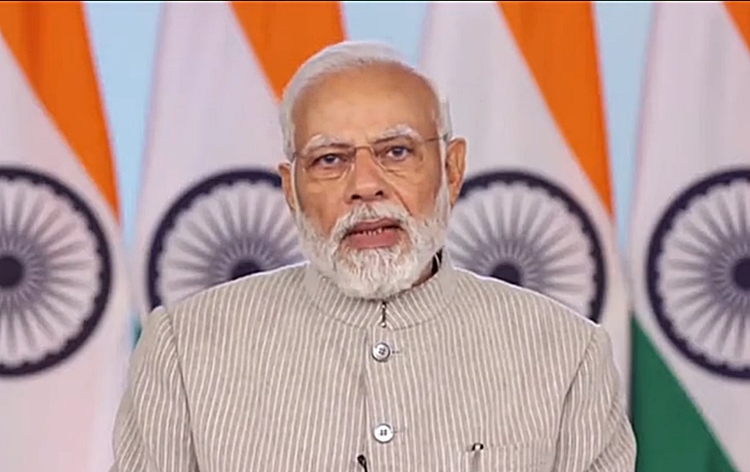Dubai: In a landmark announcement at the COP28 ,Prime Minister Narendra Modi launched the ‘Green Credit Initiative,’ a pathbreaking program aimed at reshaping global environmental policies. The Prime Minister also launched the official portal of the Green credit initiative at COP28. The Prime Minister highlighted the limitations of the current carbon credit system, influenced by commercial interests and lacking a sense of social responsibility, paving the way for a new philosophy embodied in the ‘Green Credit’ concept.
Speaking at the high-level event on the Green Credits Programme, Modi emphasized, “We will have to emphasize a new philosophy in a holistic manner, and that is the foundation of Green Credit.”The ‘Green Credit Initiative’ is positioned as a pro-planet, proactive, and positive step towards fostering a sustainable future.
“Prakriti rakshithi rakhihitha,” Modi underscored the need to protect and preserve nature, emphasizing that the environment will protect those who protect it. He described ‘Green Credit’ as the Earth’s health card, a crucial instrument for ensuring a greener, clearer, and better future.
Modi detailed the key features of the ‘Green Credit’ system, envisioning it as a fully digital and tradable instrument for environmental sustainability. He stressed the importance of launching the ‘Green Credit Portal,’ a repository documenting plantations and environmental projects to shape global demand for future policies.
The ‘Green Credit Initiative’ has garnered international support, with leaders expressing enthusiasm and commitment to the cause.Ulf Kristersson Johnson, Prime Minister of Sweden, praised the initiative, citing Sweden’s success with the Climate Leap, reducing climate emissions by 3.3 million tonnes per year through collective action.
Filipe Nyusi President of Mozambique, aligned the ‘Green Credit Initiative’ with Mozambique’s sustainable forest management initiative, inviting global collaboration. He urged inclusion on the Global Green Credit web platform, set to launch, and extended an invitation to join the international conference on forest conservation in Washington DC.
Charles Michel, President of the European Council, lauded Modi’s leadership and expressed the European Union’s commitment to ambitious climate goals. Michel emphasized the importance of robust, transparent, and impactful green credit systems and advocated for reforming global financial institutions to meet current challenges.
Unveiled on October 13, 2023, by the Union Ministry of Environment, Forest and Climate Change, the Green Credit Program is an initiative within the government’s broader Lifestyle for Environment or Life Movement. In its initial phase, the Green Credit Program gives priority to two essential activities: water conservation and afforestation. At its essence, this innovative program serves as a pioneering market-based instrument meticulously crafted to encourage voluntary environmental actions across various sectors, involving individuals, industries, and local bodies.
Operating as a domestic voluntary market mechanism, the program utilizes green credits as distinctive units assigned to specific environmental activities. These green credits function as tradable commodities, which can be sold on a domestic market platform.
The program identifies eight specific activities, encompassing tree plantation, water conservation, sustainable agriculture, waste management, air pollution reduction, mangrove conservation and restoration, Eco Mark (a government scheme for identifying environmentally friendly products), and sustainable building and infrastructure. Each activity is subject to predefined thresholds and benchmarks.The administration of the Green Credit Program is entrusted to the Indian Council of Forestry Research and Education. This institute acts as the program’s administrator, tasked with developing comprehensive guidelines, processes, and procedures for effective implementation. Furthermore, the institute will establish methodologies and standards, overseeing the registration process and associated measurement, reporting, and verification mechanisms.
The program’s overarching objective is to leverage a competitive market-based approach, motivating a diverse array of stakeholders to actively engage in voluntary environmental actions. This departure from the conventional focus on carbon emissions is widely acknowledged as a paradigm shift, recognizing and incentivizing a broader spectrum of efforts, including water conservation and waste management.














